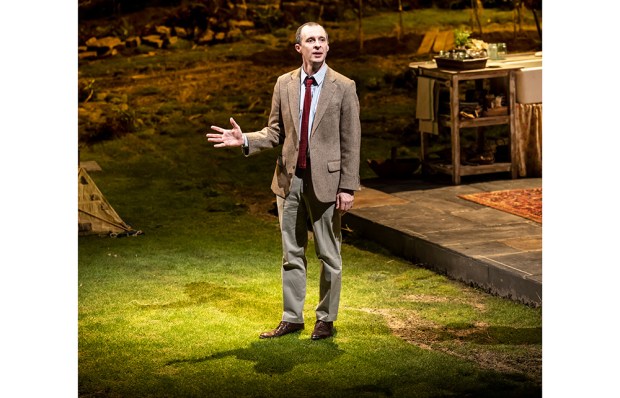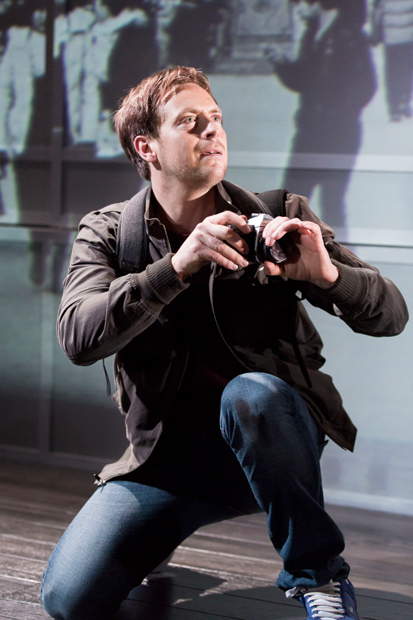The face is unlined. The tan is as deep as Brazilian hardwood. The thatch of grey hair looks like a gift from God rather than the achievement of surgical intervention. At 63, the actor Henry Goodman keeps himself in excellent trim. He exudes energy and concentration, and in the hour we spend together, he relates every aspect of our talk straight back to the show he’s promoting, The Resistible Rise of Arturo Ui. Brecht’s political allegory uses imaginary figures from Chicago’s underworld to satirise Hitler’s assumption of power in Germany during the 1930s. The script was written in just three weeks, in 1941, while Brecht was in exile in Helsinki awaiting his visa for America.
‘Brecht wrote this to warn the Americans: fascism could happen in your country. You love gangsters. You love murderers. You love film stars. You love celebrity. How can I convince you that in your culture such a terrible thing could happen? By taking your gangsters, your Capones, and showing you how these people can get away with terrible things because there’s corruption all around. That’s why he chooses Chicago. It’s corrupt.’
Goodman’s upbringing in Whitechapel, east London, gave him an automatic understanding of the lead character. ‘To grow out of my surroundings, without in any way looking down on them, I had to move out of them and improve myself. That’s what happens in Ui. This actor comes in, just like Hitler, and says, “I want to learn to talk better. I want to learn to, er, you know, ercu-lution lessons.” He gets things wrong and he’s an idiot. That’s what happened to Hitler, and to Ui. Insignificant little shits, little nerds who everyone laughed at until something happened that made them say, “I’ll stop your laughing.” Not that I was laughed at, it was a wonderful community. But what I understand is that hunger. I remember a teacher saying to me, “You were born on the wrong side of the tracks. But you’ve every right to go to the National Gallery. And, by the way, here’s Shakespeare.”’
He graduated from RADA in the early Seventies, joined a commune in Kentish Town and plunged into radical theatre. ‘I was jumping up on tables in Leicester Square to raise money to stop the demolition of Eros in Piccadilly.’
With a grant from the Ford Foundation, he toured South Africa for ten years running shows in churches and townships. ‘We used some of the techniques I’d learned in London, interaction and game theory. It sounds as if it might be a bit childish but it wasn’t. It was extremely clever group dynamics. People would listen and learn. You created structure. People enjoyed themselves and in enjoying themselves they could talk freely about things they might not otherwise talk about.’ He’s keen not to be seen as ‘some old leftie’. ‘I’m not a radical Marxist at all but, yes, I’m left of centre.’ He’s aware that corruption and ‘self-aggrandisement’ can also affect those whose political sympathies he shares.
‘We’re discovering that the BBC has sacked lots of artistic people and paid out enough to one individual, for three years of administrative duties, that would have kept all those people in work. And they’ve lost their jobs, their pensions, for ever. It’s a fact that there’s this scepticism about who we can trust. And the spine of this play is trust.’ He says that Brecht loves to mock the rhetoric of demagogues who falsely claim empathy with the masses. He deepens his voice in a purring imitation. ‘You can trust me. I’m here for you.’ His tone puts me in mind of Tony Blair. Is that what he’s getting at? He responds rather sternly. ‘This play is about Arturo Ui and it’s about Hitler. But I cannot possibly sit here and say Blair is Hitler. Please, please, don’t say that. I hope you won’t mis-report me there. It would be insane to say that. What is much more interesting is the guise of concern for the poor. That’s what’s going on.’
I turn the conversation to Brecht’s reputation as one of the most divisive playwrights of the 20th century. Goodman leaps in. ‘He is divisive because he’s a theorist and not just a dramatist. He’s manipulating his dramaturgy in order to push Marxism and there are times when the two don’t fit.’ He wants to correct the misapprehension that Brecht was a lifelong enemy of capitalism. ‘When he was a young man he was enamoured of America. He thought this was the new culture, in a political sense, that would have a different relationship between the individual and society. The frontier mentality.’
Goodman visited Germany, with the director Jonathan Church, while preparing for this production. At Brecht’s house in Berlin they saw evidence of his cultural tastes. ‘There were rows of American dime novels, detective stories. He watched Scarface, he watched Charlie Chaplin, The Great Dictator, all these things. He knew them backwards. He loved America. When he went to live there he realised it was full of dangers and that capitalism uncontrolled is fatal. Everyone assumes he’s completely anti-capitalist but he started out differently.’
He’s aware that Brecht’s fame as a tub-thumper may not help the box office. ‘It doesn’t have to be dry and desiccated and intellectual. The trick is to make it popular and entertaining and yet to be about something, to be engaged politically. I want to have my cake and eat it.’ He points out that the play carries resonances that Brecht can’t possibly have anticipated. ‘I’d defy anyone to watch it and not think, “Oh, wow, that’s going on here right now.” There’s an enquiry in the show, literally an enquiry.’ And he does an impersonation of Rupert Murdoch appearing before the Culture and Media select committee in 2011. ‘“I’m a really humble man. I’m really humble.” Later we hear from that recording that it’s all bullshit. He put on an act.’
Goodman calls himself ‘an agent of redress’ and describes his artistic mission as the exposure of duplicity. His list of targets isn’t limited to media moguls. ‘A lot of the guise of Boris Johnson is to be one of the people. And I’m afraid I am sceptical. It’s my job as an actor to make people realise “you scheming sod”. I feel like I’m serving society by elucidating that.’ Is there anything else that he particularly enjoys about Ui? ‘It means a lot to me personally as a Jewish person. It’s like saying UP YOU to Hitler.’
Got something to add? Join the discussion and comment below.
Get 10 issues for just $10
Subscribe to The Spectator Australia today for the next 10 magazine issues, plus full online access, for just $10.
The Resistible Rise of Arturo Ui runs at the Duchess Theatre from 18 September until 7 December.
You might disagree with half of it, but you’ll enjoy reading all of it. Try your first month for free, then just $2 a week for the remainder of your first year.













Comments
Don't miss out
Join the conversation with other Spectator Australia readers. Subscribe to leave a comment.
SUBSCRIBEAlready a subscriber? Log in